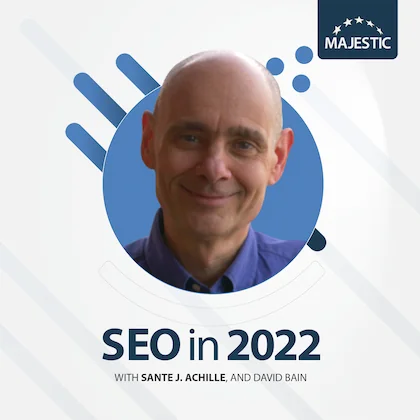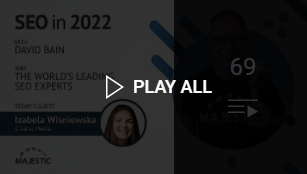-
Site Explorer
- Majestic
- Summary
- Ref Domains
- Backlinks
 New
New Lost
Lost- Context
- Anchor Text
- Pages
- Topics
- Link Graph
- Related Sites
- Advanced Tools
- Author ExplorerBeta
- Summary
- Similar Profiles
- Profile Backlinks
- Attributions
- Compare
-
Link Tools
- My Majestic
- Recent Activity
- Reports
- Campaigns
- Verified Domains
- OpenApps
- API Keys
- Keywords
- Keyword Generator
- Keyword Checker
- Search Explorer
- Link Tools
- Bulk Backlinks
- Neighbourhood Checker
- Submit URLs
- Experimental
- Index Merger
- Link Profile Fight
- Mutual Links
- Solo Links
- PDF Report
- Typo Domain
- Free SEO Tools
-
Support
- Blog

- Support
- Get started
- Tools
- Subscriptions & Billing
- FAQs
- Glossary
- How To Videos
- API Reference Guide

- Contact Us
- About Backlinks and SEO
- SEO in 2024
- Link Building Guides
- Webinars
- Blog
Modern SEO is similar to Heisenberg's uncertainty principle in quantum mechanics
Sante J. Achille
Sante warns that no matter how well you think you can plan your SEO success, you're never going to fully understand the algorithms.

Modern SEO is similar to Heisenberg's uncertainty principle in quantum mechanics
Sante says: "Be very wary about relying too much on your rankings and performance, as far as reporting is concerned.
I have been thinking about the Heisenberg principle recently, which was one of the first things I learned when studying chemistry many years ago. It was on one of the first pages of a very thick Inorganic Chemistry book. It laid the foundation for modern chemistry and the understanding for how matter is built. Heisenberg's Uncertainty Principle disrupted the old theory on the structure of atoms - that electrons were rotating around the nucleus, etc. It basically stated that it's not possible to exactly predict the state, position, or momentum of particles. I see a strong similarity between that and what is happening now, and will continue to happen, in SEO."
How does this affect the way you think about SEO?
"Right now, there is an extensive use of tools that give you predictions. They produce reports on your performance, in terms of your position and ranking. I am reluctant to rely on that kind of information and I try to stick as much as possible to whatever Search Console comes back with. It's not the entirety of the information, because it's only a portion of what is going on, but it is a significant order of magnitude of what is happening. It will tell you where your site is, who it's being presented to, in what form and with which kind of queries your pages are surfacing on the search engine results pages.
That will give you an idea of who is looking for your pages, or even better, what the intent is of people that are looking for pages like yours. You can then identify how close you are to that kind of need, and how close you are to solving someone's problem. However, it is always an unpredictable situation. Flying blind is the right way of looking at it when you're doing this kind of thing. You are trying to understand where you are, what you have to offer, and what are the needs of the people that are looking for you.
It used to be easier to see where you were on the SERPs. You could see yourself across different browsers in different locations, which is literally impossible at the moment. Now, you can hop on a proxy, change locations, change browser, be logged in or not logged in, and you'll see completely different sets of results. It's too simple to say that you have a certain position or ranking. You have to rely more and more on performance results and business transaction contexts to guide you."
What does this mean for SEO forecasting? How can you predict the financial outcome of your activities, and communicate the value of the process?
"It can be challenging. Sophisticated SEO goes beyond most people. Look at things like natural language programming and you are just scratching the surface of what rankings actually entail - the mathematics behind them, and how words become numbers. It changes the way you look at the entire activity. When words are no longer words, and they become numbers, they're in a different space, and a different league. It's a matrix of zeros and ones, sparse matrices, principal components, and eigenvalues. That needs to remain under the carpet - you cannot talk to the majority of people with this language. It is a challenge; most people don't understand it and it can be intimidating.
The other problem is that it's totally unpredictable. The time lag means that it can take a while for results to actually surface. I've recently had a bad experience with a client that freaked out because they thought I was taking advantage of them. They thought I was talking nonsense and that I wasn't going to deliver, because it took a couple of months for the first results to come through. The problem is crossing that desert and waiting for the results to come along. Once the results are there, they realise how quality SEO can change the course of events for an enterprise.
Explaining the process is something that has to be carefully processed, depending on the person that is sitting in front of you. That can be more challenging than doing the technical SEO itself."
You've stated that ranking and performance are stochastic variables, what does that mean?
"To say that they are stochastic variables is to say that they are equivalent to random elements. It means that it's a process that is not, by any means, under our control, and there is no recognisable pattern that we can follow to identify a strategy and fulfil an objective. There is a slight difference between this meaning and the purely mathematical terminology of 'stochastic'.
I am not a mathematician; I am an engineer - I studied engineering. I worked for the aerospace industry for about eight years before I changed path. My approach to modelling and mathematics has always been a very practical and less theoretical one. I've always been a fan of mathematics and modelling, but in using the tools for a purpose and not for the sake of studying the tools themselves."
If it's now almost impossible to measure cause and effect, and predict outcomes, should SEOs simply try to deliver on user experience, oversee great content that's relevant to users, and hope that the machine will recognise your value?
"I tend not to believe the fairy tale: that delivering great value for the user through a wonderful experience will magically float you to the top of the search results pages. You can try to follow a philanthropic approach, with a mission to make people feel wonderful, but SEO doesn't work like that. There can be a lot of science behind the way you approach SEO. Orders of magnitude are what typically 'guarantee' that you will fulfil the objective of providing quality traffic at a steady rate, both on-site and off-site.
Off-site, your backlinks are important: developing a strategy, writing the right content to attract good backlinks, and using tools like Majestic to analyse your performance and that of your competitors. Try to find the right opportunity for developing rewarding editorial backlinks. That is one strategy that is, and will remain to be, very beneficial. Backlinks might lose their force as a ranking factor, but the fact that you have good links from good websites will always bring quality traffic.
On-site, the way you actually build a page can have a big impact. One thing to focus on is paying attention to your use of images and having enough of the right images with the right name. People don't like to use images very much, or don't use them in the best way, because it's time consuming. You need to write a piece and include the right image with a caption, a title, an alt tag that describes the right thing, have the name of the image be the right name, and then combine the right elements of intent.
SEO is becoming less about specific keywords and more about the topics around which people search. You need to be there with your content and be able to pinpoint a certain query that people put into the search engines. Try to determine the right keywords for those topics and how they can be combined in different ways. The keywords are not the focus - the focus is the topics that are then illustrated, described, and enforced throughout the copy with those keywords."
What's something that has become less relevant now, that SEOs can spend less time focussing on?
"If you want to succeed, you need to be less attached to minor details. SEOs spend too much time chasing ghosts that don't exist. As the Germans say, people look at the tree, but they miss the forest. They're very focused on trying to pinpoint small details but miss the big picture. For example, before writing an article, just go onto Google and analyse the top 15 relevant pages, (excluding the 800-pound gorillas that are there because of their brand or because they're Wikipedia). Look at those pages and try to understand what they have done, and what kind of problem they're trying to solve. Then try to combine these concepts in a meaningful and optimised way. Think less about the minor details and look at the bigger picture.
Also, dive into your own Search Console. SEOs overlook a lot of what is in Search Console, you can do wonderful things with the information there. Look at combining it with the API that Google allows you to use. With a pivot table, you can combine your URL and all the search terms that Google has associated with that URL. That is what you should be looking at, not fussing about whether you have two images or three, or if they are at the top or the bottom of the page."
You can find Sante J Achille over at Achille.name.
Choose Your Own Learning Style
 Video
Video
If you like to get up-close with your favourite SEO experts, these one-to-one interviews might just be for you.
Watch all of our episodes, FREE, on our dedicated SEO in 2022 playlist.
 Podcast
Podcast
Maybe you are more of a listener than a watcher, or prefer to learn while you commute.
SEO in 2022 is available now via all the usual podcast platforms
Don't miss out
Opt-in to receive email updates.
It's the fastest way to find out more about SEO in 2025.
Could we improve this page for you? Please tell us





